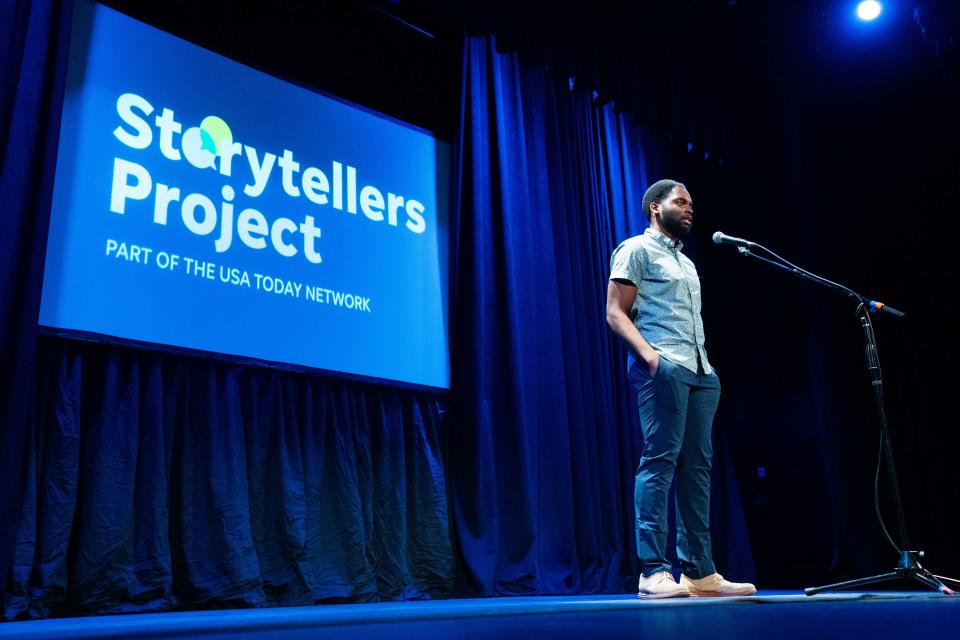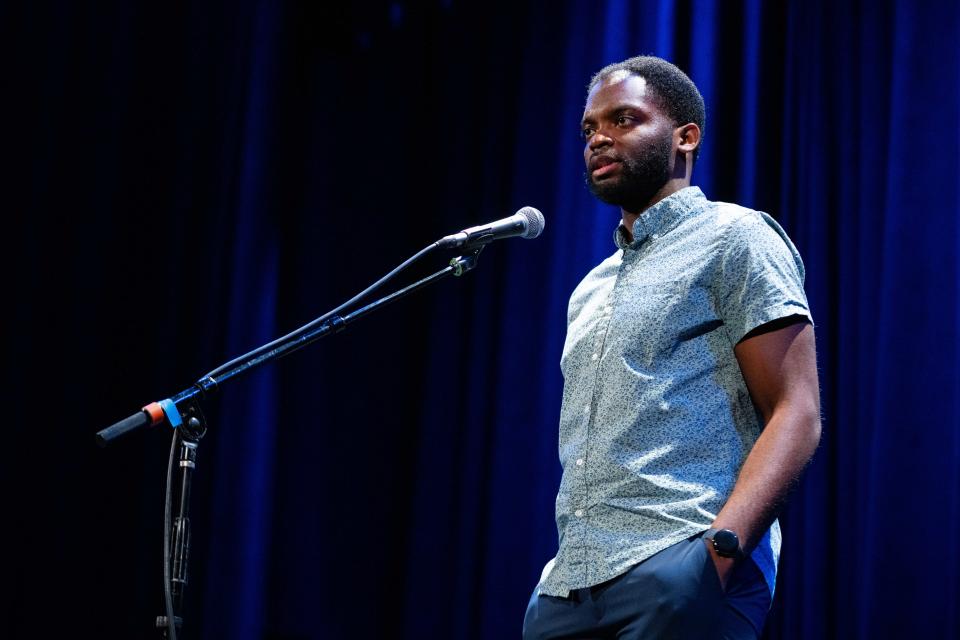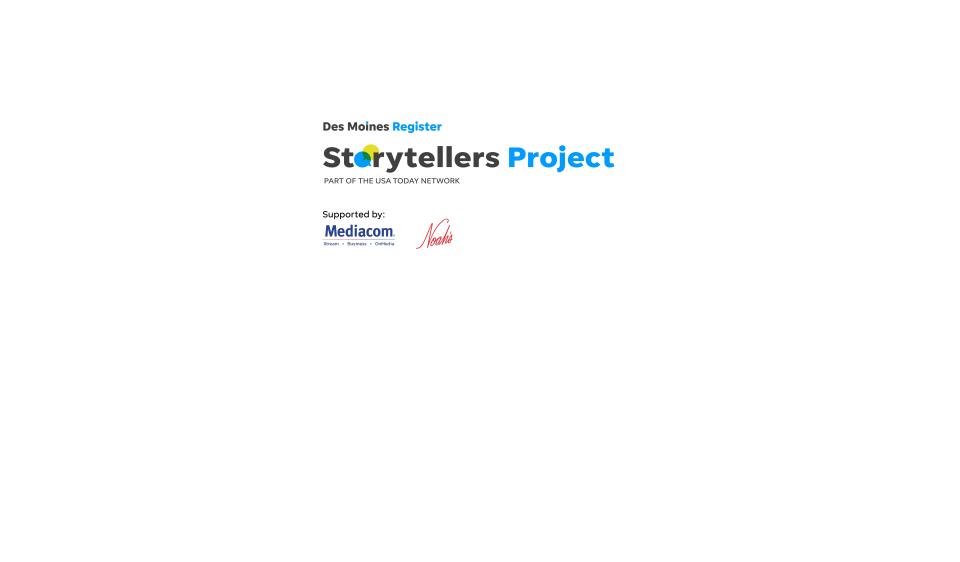How this Iowan, one of the few Black male teachers, builds community in his classroom
Editor's note: Kenny Gaskin first told this story on stage at the Des Moines Storytellers Project's "Community." The Des Moines Storytellers Project is a series of storytelling events in which community members work with Register journalists to tell true, first-person stories live on stage. An edited version appears below.
Back in 2003, in Wilkes-Barre, Pennsylvania, fifth-grade me lived a carefree life like most kids. I went to school, did homework and played tons of neighborhood games.
Unlike most kids, I loved school. I was “the sad kid” on snow days.
I learned for the sake of learning. Though, it helped that I had some incentive to get good grades. My stepdad gave me $25 for every A I got. And, I got straight As all throughout elementary school.
In class, we’d do science projects, play games and read books like “Hatchet” and “The Box Car Children.”

Even as the quiet kid, I felt like I belonged, and I think everyone else did too. I don’t know if it was my academic performance or me just being me, but my teacher made me feel special. I got special trinkets, helped her out a lot and got to sit at the teacher's desk often. One girl even called me a “glory hogger” because of the praise and attention I received.
One day, near the end of that fifth grade year, I remember my teacher Mrs. Leighton looking at me and saying something along the lines of “you’re going to be someone in this world.” Those words stuck with me, especially as the quiet kid. I spent the next few years in tune with the school community.
Fast forward to January 2008, and my younger brother and I boarded a Martz bus with my dad, who lived in Iowa, for a permanent move to Bettendorf. This was the only option for us after my mom’s relationship with her boyfriend turned south. Here I was in a totally new community. A whiter community. It was a culture shock.
I felt a bit out of place. I was always a quiet kid, but I didn’t really fit in with the majority white school. I deliberately distanced myself from some of my Black peers.
I saw myself through the eyes of the white majority and couldn’t be myself. I dressed a certain way, never used profanity, stayed quiet, and had zero interest in drugs or alcohol. I might have been depressed.
My family didn’t have a lot, but I was determined to find belonging and break the cycle of poverty that so many Black and brown families endure in America.
When it came time to think about college, I questioned what my future had in store for me — what community I’d belong to during and after college. I wondered who I’d spend time with, what I would do with my life.
You see, role models for kids like me mostly consisted of athletes, entertainers and civil rights icons. I looked up to people like Martin Luther King Jr., NBA player Kevin Garnett and several rappers. I never had a Black teacher or personally knew any Black professionals.
Fewer than 2% of all of our country’s teachers are Black men.
And I am now part of that count.

About eight years ago, I became an elementary school teacher in Des Moines Public Schools.
I got a long-term substitute teaching position in April 2016. I never asked what happened to the classroom teacher. I was just happy to have a class to call my own for a while. As I took over the fourth-grade class, all I heard were: “Good luck!” and “You sure you want to do this?”
I just smiled and nodded.
Right away on that first day, I realized this might be a challenge. Students were fighting, destroying things, swearing, screaming, daydreaming. You name it. Seven of the 24 students had behavior goals.
Thankfully, the admin supported the room with one to two additional staff members who rotated in and out every hour until we got a handle on things. They co-taught with me, but the main responsibility was creating a positive culture, a strong classroom community.
When it came to teaching, I connected lessons to the students’ lives and maintained a sense of my patience and understanding self as opposed to coming in there like Ms. Trunchbull from “Matilda.”
We rebuilt that community through one-on-one conversations, whole class recess games, lunch with students, literature circles and fictional writing. We got the room on track for the most part.
I went into my first official year teaching fifth grade knowing a lot more about community building in a classroom. I was vulnerable in speaking about the challenges of my upbringing. We talked about real stuff — things like adoption, race and the 2016 election. We talked about fun stuff like video games, slime-making and Pokémon. We also did fun things like bottle flipping, science experiments and the "Mannequin Challenge."
And yes, I taught the mandated reading and math lessons by the book. It was clear to me that I had a lot to learn about teaching despite decent test scores. Throughout all the ups and downs, I believe we had a strong classroom community.
Being a Black man in a field dominated by white women isn’t easy. I’ve always questioned what colleagues and parents were thinking. I felt pressure to trust my colleagues’ words even when I disagreed with something. For example, I couldn’t muster up the strength to say something when they suggested skipping slavery lessons in Social Studies one year.
I’ve grown accustomed to microaggressions — to not receive eye contact during conversations. I felt the need to look and sound professional in dress pants and dress shirts. I froze when someone angrily demanded my students stand for the pledge even though the law says we can’t force them to.
Despite these things, I believe I’ve always felt a high level of community or purpose with my colleagues, students and families.

I also see the benefits of being a positive Black role model when working with kids. I can be sure that my approach is unlike most they’ve seen. I’ve been middle class. I’ve been poor. I’ve lived in single-parent households and two-parent households. I’ve been discriminated against, witnessed domestic violence and had incarcerated family members.
Community is vital for kids with similar experiences.
My second year roster was diverse in several ways, but I often heard students joking about their differences without realizing how hurtful they were being. A dark-skinned girl whose family immigrated from Africa would get teased about her skin tone.
I made sure to be there for her and remind her that Black is beautiful. I remember handing her Sharon Flake’s award-winning book called “Skin I’m In.” She looked just like the girl on the cover and thought reading it would help her become more comfortable in her skin, just as the main character, Maleeka, did.
You should have seen the smile on her face. She even asked for it as her “promotion” book that fifth-graders received on the last day. Just like my fifth-grade teacher made me feel special, I was able to help that little girl feel a sense of belonging.
Large class sizes, personal struggles and COVID really affected the middle of my career, but I've enjoyed building with students these last few years.
Despite the pay, systemic changes, and proposed changes within the profession, relationships with colleagues, students and families make it easy to go into work each day.
I was reminded of the characteristics and impact of my community after reading a sub note when I was out two months ago. She said I had a wonderful group who looked out for one another. That she can tell students appreciate my calm and affirming teaching style. To keep doing what I'm doing because it’s having a positive impact — and that she'd welcome the opportunity to come back, which is unheard of these days.
My first group of students are high school seniors now. I've run into some of them and gotten emails from others. They have shared with me how fifth grade was their favorite year. How I supported them in staying true to themselves and being leaders. One student is pursuing journalism while another is doing missionary work outside the U.S.
Early on, I was determined to find purpose and community in my career for my well-being. But as the years go on and society becomes more polarized, that focus has shifted to ensuring my students feel like they belong and believe they can do anything.
I can’t imagine any other career or any other community to be a part of. That shy, quiet, Black boy grew up and found his community in a place that fails so many regardless of race. My classroom is a home away from home.
I’m thankful for the colleagues, parents, and 20 to 25 9- and 10-year-olds that I get to share it with every year. I find comfort in knowing that I’m a part of something committed to improving society.
Students won’t remember what I taught them, but I hope they remember how I made them feel. How I urged them to value education and how they can do anything. I hope they find their place in the world and contribute to their communities as I did.
ABOUT THE STORYTELLER: Kenny Gaskin is a fourth-grade teacher in Des Moines. He has a bachelor’s from the University of Iowa and a master’s from Drake University. His favorite people are his wife and two kids. Kenny enjoys learning new things, reading, video games, and playing recreational sports.

Become a teller
The Des Moines Storytellers Project strongly believes that everyone HAS a story and everyone CAN tell it. None of the storytellers who take our stage are professionals. They are your neighbors, friends or co-workers, and they are coached to tell by Register journalists.
Want to tell your story at one of our upcoming Storytellers Project events? Read our guidelines and submit a story at DesMoinesRegister.com/Tell.
Contact storytelling@dmreg.com for more information.
Hear past storytellers
WATCH: Mediacom rebroadcasts stories from the most recent show on MC22 periodically; check local listings for times. A replay is also available at YouTube.com/DMRegister.
LISTEN: Check out the Des Moines Storytellers Project podcast, which is available on your favorite podcasting platforms.
Your subscription makes work like this possible. Subscribe today at DesMoinesRegister.com/Deal.
This article originally appeared on Des Moines Register: How this Iowan, one of the few Black male teachers, builds community

